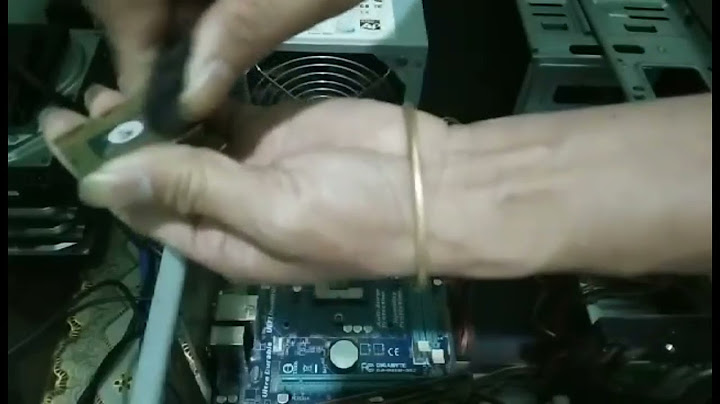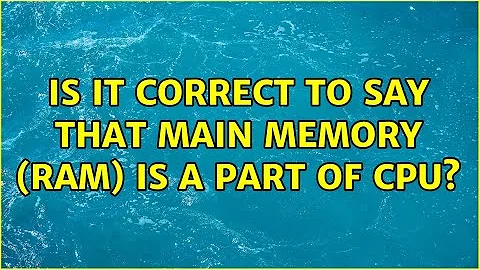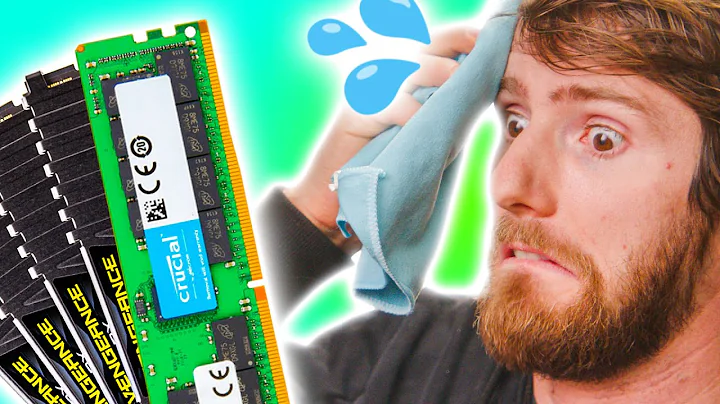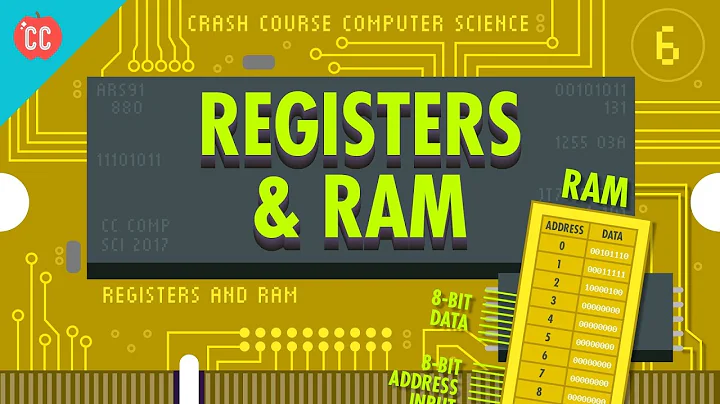Is it correct to say that main memory (RAM) is a part of CPU?
Solution 1
The key point in your question is my English teacher so this is not about technology but about English language understanding and possibly translation.
Whether the text is technically correct or not shouldn't matter. If the author wrote the RAM is part of the CPU, you have to take it as it is and not alter the author text. Arguing about computing details with an English teacher is probably pointless and doomed, as you experienced.
In any case, the text you studied is quite outdated, probably from the early eighties, as this sentence exhibits: Microcomputers, commonly known as micros, are the smallest and the least powerful. They are about the size of a typewriter. Its author is opposing the Central Processing Unit to the peripherals in which case RAM is indeed part of the former. Later, the text tells the microprocessor is made of registers and an ALU and that it acts as the Central Processing Unit of the computer, rectifying the controversial initial statement.
Solution 2
First, I'll focus on your question:
Is it correct to say that main memory (RAM) is a part of CPU?
Which seems prompted by the quoted assertion that:
The most important item of hardware is the CPU (Central Processing Unit)....It contains the processor and the main memory.
No, the CPU doesn't contain Main Memory.
Wikipedia defines the CPU as:
A central processing unit (CPU) is the electronic circuitry within a computer that carries out the instructions of a computer program by performing the basic arithmetic, logical, control and input/output (I/O) operations specified by the instructions. The computer industry has used the term "central processing unit" at least since the early 1960s. Traditionally, the term "CPU" refers to a processor, more specifically to its processing unit and control unit (CU), distinguishing these core elements of a computer from external components such as main memory and I/O circuitry.
The Processor is separate from main memory. Going all the way back to the the Intel 4004 created in 1971, the first microprocessor in which modern CPUs find their legacy, RAM (a.k.a. "Main Memory") has been a component external to the CPU.
Here's a block diagram of the 4004's successor, the Intel 8080, introduced in April 1974 (it's very similar to the Motorola 6800 released in August of the same year):
Notice the pins labeled D0-7 and A0-15. The D pins are connected to the Main Memory and are used to transfer 8-bits of data to or from RAM at a time. This makes the Intel 8080 an 8-bit processor. The A pins are also connected to Main Memory, but are used to specify the address in memory that should be accessed by the next data read/write operation. These 16 address signals enable the processor to access up to 64KB of memory (216 = 65536 = 64KB).
The fact that memory is external to the processor is explained on page 263 of the book Code by Charles Petzold (published by Microsoft Press):
The 8080 is an 8-bit microprocessor that reads data from memory and writes data to memory 8 bits at a time. The chip includes eight signals labeled D0 through D7. These signals are the only ones on the chip that are both inputs and outputs. When the microprocessor reads a byte of memory, the pins function as inputs; when the microprocessor writes a byte to memory, the pins function as outputs. [emphasis mine]
Of course, an input (or output) signal is only necessary when a device connects to another device, in this case, Main Memory.
A further observation is that if Main Memory were integrated into the CPU, it would be impossible to expand the amount of memory available to the computer. It was recognized very early in the course of developing integrated circuits used for computers, in part to the extremely high cost of RAM at the time, that users may need to add more memory later. It would and continues to be a ludicrous idea to integrate Main Memory into the CPU.
Is it correct to say that CPU contains RAM? Or did it at any point in any form?
Yes, even early CPUs contained RAM (kinda).
That is, if by RAM we mean memory that can be accessed non-sequentially and is volatile, i.e. its content is lost when power is no longer applied.
On page 264 of Code we find a description of this "integrated memory":
In addition to the accumulator, the 8080 contains six registers that can also hold 8-bit values inside the microprocessor....Like the accumulator, the other six registers are latches; the processor can move bytes from memory into registers, and from registers back into memory.
So this is probably a stretch of the definition of RAM (and it's by no means Main Memory). However, it's obvious that the Registers in a CPU function as memory. For example, they are used to temporarily store values while the processor performs calculations using the Accumulator or store an address in Main Memory to read/write data to/from.
Modern processors now also include CPU Cache. This still isn't Main Memory though. When it comes to the CPU's cache and Main Memory, the former is used to store a copy of select data found in RAM in order to speed up processing time (by virtue of the fact cache memory is much faster than main memory). At no point does the CPU use its cache as a "permanent" storage location for data in the way Main Memory is used.
Side note:
As others have noted, the full of the text quoted in your question is a bit ambiguous. Particularly the bit I quoted earlier:
The most important item of hardware is the CPU (Central Processing Unit)....It contains the processor and the main memory.
Whether the text means to claim the CPU is the box in which all of the other "important" components are contained, or that it is the microprocessor, I can't say. Whatever the case, hopefully this answer helps provide an answer to what I believe your core question is: Whether or not main memory is part of the CPU.
Related videos on Youtube
mushi.f
Updated on September 18, 2022Comments
-
mushi.f over 1 year
I recently had an argue with my English teacher, because of text given to us for translation. It states:
The pieces of equipment making up the computer system are known as hardware. The most important item of hardware is the CPU (Central Processing Unit). This is the electronic unit at the centre of the computer system. It contains the processor and the main memory.
She rejected my point about that author probably meant CPU cache and clarified that main memory is RAM. Nor did she accept that he's probably wrong in that case.
I didn't get any explanations about that. Trying to find something in Google didn't help me either.
The text is about computers and in the following paragraphs it claims that computers may have a keyboard, display and printer; I guess it's pretty safe to say that the text is about PCs.
So, with exception of microcontrollers and SoC (most of them use external memory however), is it correct to say that CPU contains RAM? Or did it at any point in any form?
-
 I say Reinstate Monica about 7 yearsthat defined CPU as the computer case... The OP clearly quotes the definition in question of CPU is Central Processing Unit, convincingly excluding the much-less accurate description of the entire computer as the CPU.
I say Reinstate Monica about 7 yearsthat defined CPU as the computer case... The OP clearly quotes the definition in question of CPU is Central Processing Unit, convincingly excluding the much-less accurate description of the entire computer as the CPU. -
barlop about 7 years@Twisty You wrote "the definition in question of CPU is Central Processing Unit, " <-- Well obviously. What else do you think CPU would stand for? Regardless of whether using the old definition of entire box, or the definition of processor, people meant CPU as an acronym for central processing unit.
-
 I say Reinstate Monica about 7 yearsI'm responding to what appears to be a possible allowance in your question that the OP's quote might be referencing the archaic definition of CPU to mean "the entire box." My apologies if you're not intending to consider that a valid interpretation of the quoted text.
I say Reinstate Monica about 7 yearsI'm responding to what appears to be a possible allowance in your question that the OP's quote might be referencing the archaic definition of CPU to mean "the entire box." My apologies if you're not intending to consider that a valid interpretation of the quoted text. -
barlop about 7 years@Twisty Obviously I am considering that interpretation " the archaic definition of CPU to mean 'the entire box.' ", That's the whole point of my post. You're not understanding my post or my response to you at all.
-
barlop about 7 yearsYou wrote , quoting "the electronic unit at the centre of the computer system." , and said that "Based on this description, I understand the reference to CPU to mean exactly what's stated in your quote, the Central Processing Unit, or simply Processor." <-- Have you not considered that under the older definition of CPU as box, it's still at the centre, with periphrals connected to it.. such as a keyboard, screen, monitor.
-
barlop about 7 yearsAlso, you write "memory is external to the processor " <-- Main memory is.. But not all memory is. A processor has registers - that's memory. It's true that the OP asked about main memory, but if you mean main memory then say main memory. Don't just say memory generally.
-
barlop about 7 yearsIn fact it's arguably even more at the centre in the old definition, than in the more modern definition. If you look at a motherboard, you'd see the CPU tends to be near one side, not physically central, whereas in the older definition of the computer case, with its periphrals, it's pretty central physically, not just logically.
-
barlop about 7 yearsAnd you snipped the last sentence of the text that says "It contains the processor and the main memory.". Since you think "it" refers to a processor, do you seriously think that the text is saying that a processor contains a processor?
-
 I say Reinstate Monica about 7 years@barlop I'm choosing to answer the question from the perspective that in the quoted text CPU=Microprocessor. As do you, I find the quoted text a bit ambiguous; a fact I'm interpreting to mean the text's author simply didn't understand what he was writing, and therefore didn't use technically accurate language.
I say Reinstate Monica about 7 years@barlop I'm choosing to answer the question from the perspective that in the quoted text CPU=Microprocessor. As do you, I find the quoted text a bit ambiguous; a fact I'm interpreting to mean the text's author simply didn't understand what he was writing, and therefore didn't use technically accurate language. -
barlop about 7 yearsNo I don't twisty.
-
barlop about 7 years@LPChip You write "-1 for thinking it is a world wide phenomenom." <-- Your -1- reasoning, is wrong,a)I didn't say I thought it was or was not a world-wide thing b)I questioned the commenter Classic Stacker(who had heard the old usage), I questioned him on where he was from and he stated his experience that it is worldwide, from international "cocom" projects he worked on(and that even includes usa, besides europe and uk), so his experience is Yes it is, so no presumption there from him or from me.
-
barlop about 7 years@LPChip I had in fact suggested that it might just be just an old UK usage(a suggestion that you'd have stubbornly agreed with and gone further with), but I removed that suggestion after the commenter "Classic Stacker" gave his experience of that usage on international projects he worked on.
-
mushi.f about 7 yearsInteresting point of view; it clears something, because she did refer to textbooks. However I don't know origins of them, maybe they were actually from UK.
-
mushi.f about 7 years>She's right that Main memory is RAM, and you were wrong not to agree with her on that - that main memory is RAM.< I understand that main memory is RAM. But if you tell me that CPU chip contains RAM I would assume that you just confused terms and wanted to say cache (actually I would ask you to clarify that, but this isn't a quick process if you want to do that to the author of textbook, yeah).
-
mushi.f about 7 yearsI have to say...I love this community! Amount of feedback I got for such simple question is insane. Thanks a lot for such detailed answer.
-
mushi.f about 7 yearsI agree on that I should just follow the excercises and not try to find author errors, but I'm studying on IT-subject; and our English textbooks were specially designed for this course. So translating such thing like I didn't noticed anything must create some dissonance in my head, don't you think?
-
mushi.f about 7 yearsBy the way, thanks for quote source, I haven't seen orininal text (ours is like half of that, without these obvious signs of old age).
-
barlop about 7 years@mushi.f there's a difference between relevant detail, and muddying the waters with irrelevant detail.
-
barlop about 7 yearsAnd you write " I'm choosing to answer the question from the perspective that in the quoted text CPU=Microprocessor. " <-- That is simply not the perspective of the author of the text, and it makes complete gibberish of the quoted text. From your perspective, the author is saying that the processor contains a processor, which is nonsense.
-
barlop about 7 years@mushi.f Look at the answer from jlliagre it proves my point.. he found the text you are talking about and the meaning of CPU in that text is indeed not as this answer claims.
-
barlop about 7 yearsWell done for finding the text and showing which definition of CPU was being used.
-
barlop about 7 years@mushi.f Obviously the processor(what you just called the cpu chip), doesn't contain RAM. And as to your other remark "maybe they were actualyl from UK" No it's not. If you look at the text in a correct answer, e,g, the one posted by jll not by twisty, you see it makes reference to cell-phone that is an american term, in the UK they say mobile phone.
-
barlop about 7 yearsAlso worth noting given some other discussion, that the use of the term cellphone shows it's not a UK textbook. So that old definition of CPU is not just a UK thing as one commenter tried to claim.
-
sawdust about 7 years@barlop "A processor has registers - that's memory" -- That's a non-technical perspective. "Registers" are expected to have additional attributes from "memory" besides "storing data". The primary attributes are speed (read/writes faster than any processor cycle) and the same interface as the control logic (i.e. no buffers chips). IOW the CPU does not have RAM.
-
barlop about 7 years@sawdust stating that registers are memory is not "non-technical", it's technically correct. All you are doing is adding more information that yeah they're fast and yeah they're not RAM. I think it has been made pretty clear by everybody that registers are not RAM.
-
barlop about 7 years@LPChip now somebody has found the book source itself and it's not a UK book so even more reason why you're wrong
-
Attie over 6 yearsWorth also pointing out that as far as the "English Language" goes, people often refer to "that box on/under the desk" as the "CPU". Technically not correct, but common enough to make it correct when we are focusing on communication, not technical accuracy.








